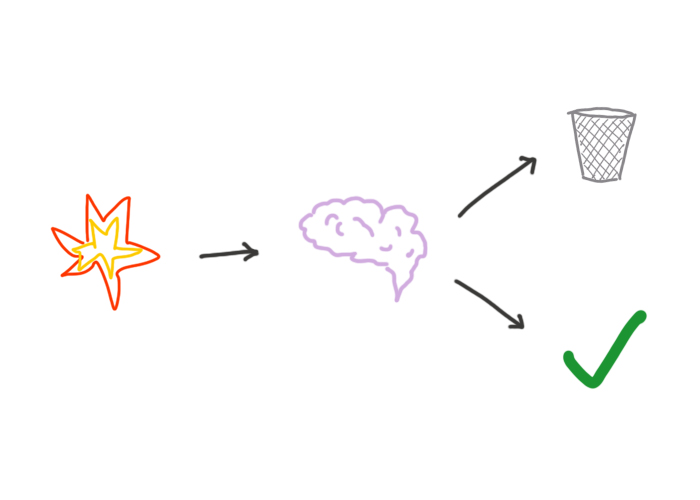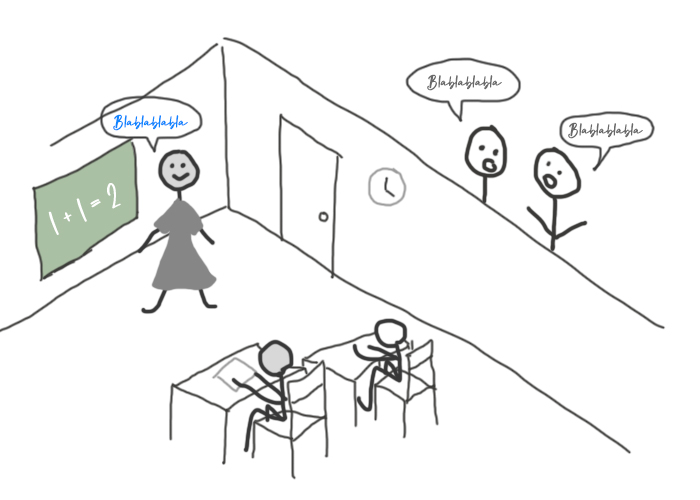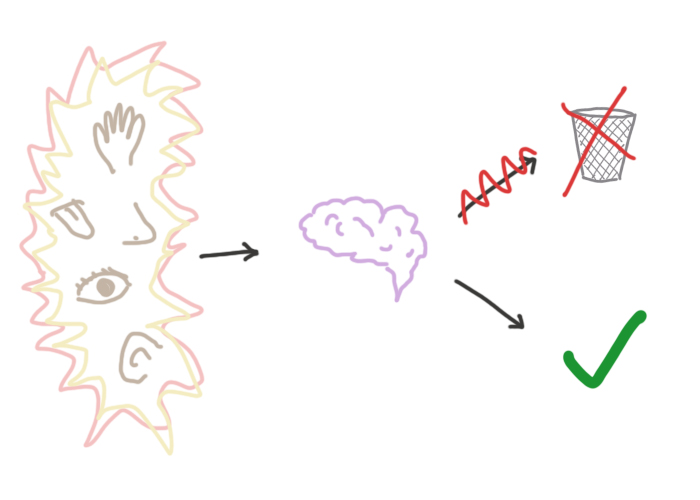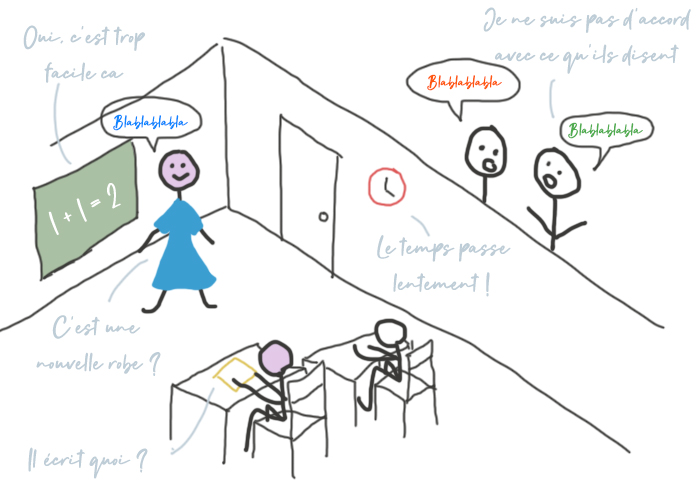En tant que haut potentiel hypersensible vous avez certainement déjà eu l’impression d’en avoir plein la tête. Et c’est tout à fait normal. Ça vient d’un truc qui s’appelle le déficit d’inhibition latente. Mais je vous rassure c’est un mot un peu barbare pour parler d’une chose très simple. En tout cas c’est à cause de ça que vous pouvez avoir l’impression que votre cerveau là-haut il surcharge et il va exploser.
Je vous explique.
PS : ça a un rapport avec l’hyperesthésie, cette hypersensibilité sensorielle qu’ont les zèbres.
Je m’appelle Paul et mon haut potentiel a été détecté il y a plus de dix ans maintenant. Et aujourd’hui, sur Connect The Dots, je partage ce que j’ai appris pour aider les autres à se développer.
L’inhibition latente
C’est parti on commence tout de suite cette vidéo sur le déficit d’inhibition latente. Mais avant de comprendre ce qu’est ce déficit de l’inhibition l’attente, il faut qu’on parle de ce qu’est l’inhibition l’attente. En fait l’inhibition l’attente c’est un processus qui se passe à l’intérieur de notre cerveau.

Pour vous l’expliquer je vous ai dessiné une espèce d’étoile / d’explosion. C’est un stimuli externe. Ça peut être n’importe quoi : un bruit, une lumière, quelque chose qu’on voit, etc., mais quelque chose qui stimule nos cinq sens, quelque chose qui vient de l’extérieur. Ce stimuli externe envoie un signal au cerveau (soit via les yeux, soit via toucher, les neurones, etc.). Cette stimulation envoie un message à notre cerveau. Ensuite le cerveau a deux choix. Le premier choix c’est de jeter cette information parce qu’elle n’est pas utile pour lui. Ou alors deuxième choix : il va intégrer cette information parce qu’elle est utile pour lui. C’est ce processus un peu de tri des informations liées aux stimuli externes qui est l’inhibition l’attente.

Par exemple si on prend un élève neurotypique en classe : j’ai mis en couleur ce à quoi il devrait prêter attention. Son cerveau va capter toutes les informations qu’il y a. Il va capter l’horloge, il va capter les autres gens autour de lui, potentiellement les gens qui discutent dans le couloir, mais il va aussi capter la prof qui parle, et ce qui est marqué au tableau. Mais son cerveau va trier toutes ces informations externes pour ne garder que les deux choses importantes qui sont ce que dit la prof est ce qu’elle écrit au tableau. C’est ce processus de tri qui est l’inhibition latente.
Le déficit d’inhibition latente
Donc on revient sur notre schéma pour pouvoir vous montrer les différences entre l’inhibition latente et le déficit d’inhibition latente qu’il y a chez les personnes HPI.

Alors déjà ce qu’il faut savoir (je ferai peut-être une vidéo là-dessus par la suite, si c’est le cas je vous mettrai le lien plus tard) les hauts potentiels et hypersensibles sont des personnes hyperesthésiques. C’est à dire qu’ils ont une hypersensibilité sensorielle. Leurs cinq sens sont en folie et ils renvoient beaucoup plus de signaux au cerveau. Pour moi par exemple, le toucher j’ai très mal avec la couture des chaussettes. Elle ne me gêne pas juste, elle me fait très mal et je dois porter toutes mes chaussettes à l’envers. Ou si un jour on se croise dans la rue vous pouvez être sûr que j’aurai des lunettes de soleil parce que je suis très vite ébloui. Ou les moindres petits bruits me gênent.
Tous ces signaux là en fait sont captés et deviennent très gênant parce qu’ils sont plus forts on a beaucoup plus de stimulations de la part de ces signaux. Et ensuite ce qu’il se passe dans le processus du déficit d’inhibition latente c’est que le cerveau ne jette rien à la poubelle. Tous les signaux sont emmagasinés. Il n’arrive pas du tout à faire le tri entre ce qui est important et pertinent, et ce qui ne l’est pas.

Donc si on revient sur notre élève neurotypique de tout à l’heure, j’avais mis en coloré ce à quoi il prête attention : ce que dit la prof et ce qui est marqué sur le tableau. Il ne fait attention qu’à ça parce que son cerveau a jeté à la poubelle toutes les autres infos. Maintenant si on revient sur l’enfant intellectuellement précoce (EIP), son cerveau ne va pas jeter à la poubelle toutes les autres infos. C’est à dire que pour lui ce que dit la prof sera aussi important que ce que disent les gens dans le couloir, que le temps qui passe, que ce que son voisin de table est en train d’écrire, que la tenue de la prof, et que tout ce qu’il voit, tout ce qu’il entend. Tout est au même niveau, et il n’arrive pas à réaliser et à prioriser. C’est pour ça notamment qu’il en a beaucoup qui ont du mal à se concentrer en cours. En fait, ce n’est pas qu’ils ont du mal à se concentrer EN cours, c’est qu’ils ont du mal à se concentrer SUR le cours parce qu’ils sont concentrés sur tout ce qu’il se passe autour d’eux. Et même si on a beau leur dire que ce qui est important c’est qu’il faut écouter les profs, ils le savent, ils savent que c’est important, mais leur cerveau ne va pas dans ce sens-là.
Il ne coupe pas toutes les autres stimulations.
Conclusion
Donc pour conclure les hauts potentiels n’arrivent pas à faire le tri parmi tous les stimulations extérieures qu’ils captent. C’est pour ça qu’ils peuvent vite se faire agresser par certains petits bruits, ou être distraits au restaurant ou dans des environnements qui sont hyper-dynamiques.
Par exemple je vais vous parler du restaurant. Si je suis au restaurant avec des potes, de la famille, ou n’importe qui, j’ai beaucoup de mal à me concentrer sur la discussion dans laquelle je suis, la discussion qui est à ma table. Parce qu’en même temps j’écoute la discussion des tables d’à côté, j’étudie les commandes qu’ils ont, je regarde les commandes qui passent, je juge tout. Et fait tout ce qu’il se passe autour de moi dans le restaurant est aussi important que la discussion que j’ai avec les gens. Du coup des fois je peux paraître un peu distrait parce que je suis en train d’écouter la conversation d’à côté ou de faire plein de trucs comme ça dans les environnements qui sont bruyants et dynamique (les restaurants, les bars, etc.).
J’habite à Paris dans un endroit qui est assez animé. Dès que je marche dans la rue j’ai quand même du mal à suivre les choses et à être un peu zen parce que je me sens complètement agressé partout et j’ai l’impression d’être surchargé parce que je prends trop d’infos tout le temps. J’emmagasine tout et tout est aussi important. Je fais gaffe à absolument tout et tout ça fait que le haut potentiel se sent vite surchargé.
Le HPI n’arrive pas, comme je disais, à prioriser les informations. On ne hiérarchise pas du tout.
Ce qui est rigolo (je vais vous raconter une petite histoire) c’est que quand ma psychologue m’a parlé de ce déficit d’inhibition latente pour la première fois j’étais dans son cabinet. Elle m’a dit « Tiens Paul je suis sûre que tu arrives, en même temps qu’on parle et qu’on a la discussion, tu peux me dire quelle est la musique dans la salle d’attente, le nombre de voitures qui sont passées derrière moi [il y avait la fenêtre sur la rue derrière elle], les livres de ma bibliothèque… ». Elle m’avait dit plein d’autres choses comme ça, et en fait je pouvais tout dire. En même temps que je parlais avec elle, la musique qu’il y avait dans la salle d’attente était toute aussi importante pour moi, et je l’écoutais en même temps. Je captais tout ce qu’il se passait dans la rue, mais sans m’en rendre compte. C’était vraiment trop bizarre sur le moment. Je n’arrivais pas prioriser. Je n’arrivais pas à me concentrer que sur elle, comme un enfant en classe qui n’arrive pas à se concentrer que sur le prof.
